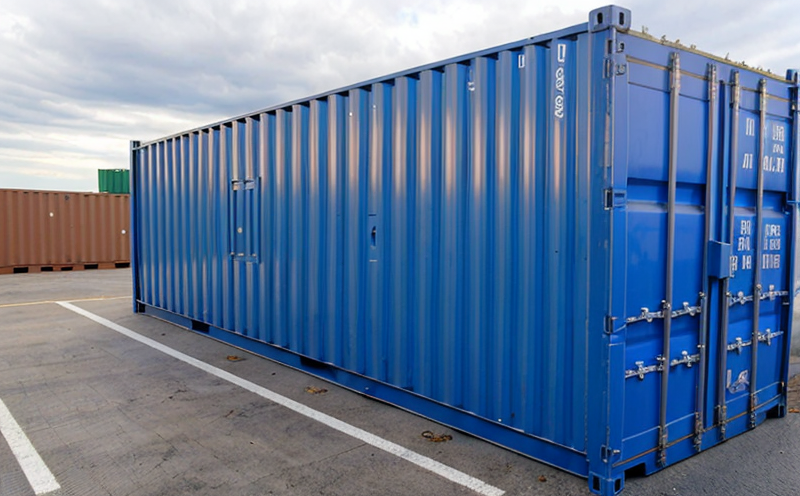ASTM D790 Flexural Testing of Plastic Storage Containers
The ASTM D790 standard specifies a method for determining the flexural properties of plastic materials. This test is particularly important when evaluating the mechanical strength and integrity of storage containers made from plastics, as it provides crucial data on how these containers will behave under stress during use.
The flexural testing procedure involves applying a load to a rectangular or cylindrical specimen until it fractures or reaches its maximum deflection. For plastic storage containers, this test is critical because the containers are subjected to various forces and stresses over time due to loading, stacking, and handling. The data obtained from ASTM D790 helps manufacturers ensure that their containers can withstand these loads without failure.
The testing apparatus used for ASTM D790 includes a universal testing machine capable of applying precise, controlled loads to the specimens. The specimen is clamped at both ends and loaded in the center until it breaks or reaches its maximum deflection. The test setup must be carefully aligned to ensure accurate measurements.
Specimen preparation is also critical for obtaining reliable results. Specimens are typically cut from larger samples of plastic, ensuring that they represent the properties of the entire material batch. Careful attention is paid to minimizing variations in thickness and orientation to maintain consistency across specimens.
The flexural modulus (E), flexural strength (σ), and flexural strain (ε) are reported based on the test results. These values provide insight into how the plastic will behave under stress, which is essential for designing containers that can safely handle their intended loads without deformation or failure.
ASTM D790 testing is not only relevant to container manufacturers but also to quality managers and compliance officers who need assurance that the materials used meet industry standards. For R&D engineers, this test offers valuable data for improving material formulations and design parameters. Additionally, procurement teams can use these results to select suppliers whose products meet strict mechanical performance criteria.
In summary, ASTM D790 flexural testing is a vital part of ensuring the integrity and reliability of plastic storage containers. By providing detailed information on how materials will perform under stress, this test supports various stakeholders in making informed decisions about material selection and design.
Benefits
The primary benefit of ASTM D790 flexural testing is the ability to evaluate the mechanical properties of plastic storage containers accurately. This ensures that the containers can withstand the forces they will encounter during use, enhancing their durability and safety. For manufacturers, this test provides valuable data for quality control and process optimization. Compliance officers gain peace of mind knowing that materials meet regulatory requirements.
For R&D engineers, ASTM D790 testing offers insights into material behavior under stress, which can guide improvements in formulation and design. In the procurement process, these results allow teams to select suppliers whose products are reliable and consistent with desired performance characteristics.
The test also supports sustainability initiatives by ensuring that materials used in containers are robust enough to minimize waste and extend product life cycles. This aligns with broader goals of reducing environmental impact through sustainable practices.
By incorporating ASTM D790 flexural testing into their quality assurance processes, organizations can enhance the reliability and safety of plastic storage containers, ultimately leading to increased customer satisfaction and reduced risk of product failure.
Environmental and Sustainability Contributions
The environmental impact of plastic storage containers is a growing concern. By ensuring that these containers are mechanically robust through ASTM D790 flexural testing, organizations can contribute positively to sustainability efforts in several ways:
- Reduced Waste: Containers that meet the required mechanical properties are less likely to fail prematurely, reducing the need for replacements and thus minimizing waste.
- Eco-Friendly Materials: Ensuring that materials used in containers meet strict standards encourages the use of eco-friendly alternatives where appropriate.
- Extended Product Life: Robust containers last longer, extending their useful life and reducing the frequency of replacements needed.
These contributions align with broader sustainability goals, helping to reduce environmental footprints associated with plastic production and disposal. By adhering to ASTM D790 flexural testing standards, organizations demonstrate a commitment to sustainable practices that benefit both the environment and society.
Use Cases and Application Examples
The use cases for ASTM D790 flexural testing in plastic storage containers are numerous and varied. Here are some specific examples:
- Pharmaceutical Industry: Ensuring that medication packaging can withstand stacking and handling without compromising product integrity.
- Food Processing Sector: Evaluating container durability to protect perishable goods from contamination during transport and storage.
- Beverage Manufacturers: Testing containers for carbonated beverages to ensure they can handle the pressure associated with carbonation processes.
- Agricultural Products: Assessing the strength of containers used to store and transport bulk agricultural products like seeds or fertilizers.
In each of these cases, ASTM D790 flexural testing plays a critical role in ensuring that plastic storage containers can perform their intended functions safely and effectively. This testing is particularly important for industries where product integrity and safety are paramount.





